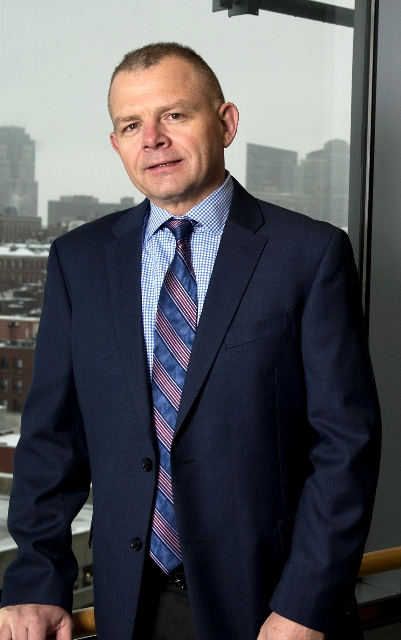In collaboration with CHIME, Becker's Hospital Review's new "Life of a Healthcare CIO" series features leading hospital and health system CIOs from across the country who are sharing their experiences, best practices and challenges.
To recommend a CIO to be featured in this series, please contact Helen Gregg (hgregg@beckershealthcare.com).
An interview with Keith Jennings, CIO of Massachusetts General Hospital in Boston. (Interview has been edited for length and clarity.)
Question: You've been CIO of Massachusetts General Hospital since 2011. How has your job changed in the past two and a half years?
Keith Jennings: Three big things. Accountable care and the [Patient Protection and Affordable Care Act] have dramatically changed the way we look at all kinds of things. We were just a big tertiary hospital, but the new governmental and regulatory landscape has changed the way we look at population health and specialty services. The world almost changed on us in a day. It really changed our focus.
Somewhat related to that, we also have acquired new affiliates. We now have three hospitals affiliated with Mass General that I am responsible for.
And, somewhere along the line we decided to implement Epic. So there's been three major things when really one of these would have been enough to keep me busy.
Q: In your time with Mass General, what has been your biggest accomplishment?
KJ: I would say there's been two. For me personally, it's been the involvement I had in Mass General's participation in the Medicare High-Cost Beneficiary pilot. It was a seven-year pilot showing that we could spend a little more upfront and really bend the cost curve. It was part of the foundation for the development of the current accountable care organization model, and we were able to make it work. I am proud I had my hand in that, and I am proud of Mass General's success in showing the nation it could be done.
The second thing is from a departmental standpoint. With all the things I had mentioned before that are changing, and all the pressures on them, I am so proud my staff is continuing to serve the hospital's clinicians, staff and patients with the same level of service and quality. With all the projects we have, you wouldn't necessarily expect it to be that way, but it is. They're part of what makes Mass General one of the top hospitals in the world.
Q: What do you see as your biggest misstep or mistake?
KJ: I never make mistakes. [Laughs]
For many years, Mass General has relied on homegrown IT systems, and now we're part of a multiyear project to convert most everything to its Epic replacement. What I thought I knew but didn't, and am realizing now, is the difficulty of keeping homegrown systems going for an extended period of time while you're bringing in a new vendor app. The staff you want working on the new thing have to be the ones to keep the proprietary infrastructure going, because they're the 12 people in the whole world who know how the order entry system at Mass General works.
I don't think we spent enough time planning how the transition would work over the three-year period.
Q: Looking back over the past month, what has taken up the majority of your time?
KJ: Even though one of the hospitals I had mentioned that has become an affiliate of ours, Cooley Dickenson [Hospital in Northampton, Mass.] joined in July, it's just last month that the integration activities have really ramped up.
There are three big things with that. All the other hospitals are on [human resource management system] PeopleSoft, we want to get Cooley on it, too. They're also not on our network yet, and while we want to be cost-sensitive, we also want to get Partners' PC's out there to them. Also, at the moment the CIO position at Cooley is vacant. There's all this work to be done at an affiliate hospital, and a key player is missing, so we're trying to get the projects going and recruit and install a CIO there at the same time.
Q: What is the biggest challenge you're facing right now?
KJ: The most immediate thing is that we're in the final stages of the Epic revenue cycle system implementation; the go-live is in July. We have all kinds of activity focused on that right now. Of course, if we raised our heads just a little bit, we'd see ICD-10 soon after, but right now this implementation is really blocking out the sun.
Q: What is one lesson you've learned during your tenure you'd like to share with other CIOs?
KJ: I've learned to see the value of having a long-term plan. You need a two-, three- even five-year plan, even if you think it's going to change. If you don't have a plan, there's nothing for anyone around you to react to, there's no milestone for staff or an icebreaker with other leaders.
Going forward, more and more of the clinical activity will be IT-based. By no means is IT most important, but the things we do are the underlying foundation for many of the things the hospital needs to do. That's why we need to get our roadmap out in front of clinical and administrative leaders so they can react to it and no one is caught off guard.
More Articles in the Life of a Healthcare CIO Series:
The Life of a Healthcare CIO: CIO of the Year Ed Marx
The Life of a Healthcare CIO: Community Hospital Anderson's Joey Hobbs
The Life of a Healthcare CIO: Hawaii Pacific Health's Steve Robertson

